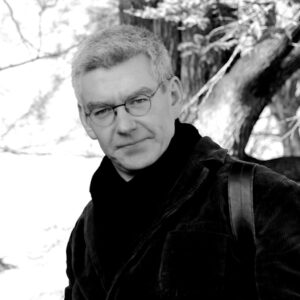In our latest episode of SocialEx, Humentum’s monthly podcast, George Miller sits down to talk to Oliver May, Director of Forensic and Risk Advisory for Deloitte Australia. Over their hour together, Oliver recounts his professional origin story, walking us from his schooldays to his current role. He also shares thoughts on next steps for the aid sector and how we can prevent and respond effectively to fraud and corruption.
This is an abridged transcript of their conversation. You can listen to the entire podcast on Amazon Music, Apple Podcasts, Audible, or Spotify!
George Miller: When I spoke to Oliver, I began by asking him why he calls the blog where he writes about fraud and corruption ‘Second Marshmallow.’
Oliver May: The title comes from a number of studies in the 60s and 70s into delayed gratification; what the researchers would do would be that they’d give a child a small snack — like a marshmallow — and say, This is your marshmallow. You can have this right now. But if you can wait for a short time, say 15 minutes, and not eat it, you can have two marshmallows! You can have a second marshmallow. And they found that children who were able to invest their time in waiting for the second marshmallow, in longitudinal studies later, would go on to be successful in a number of ways, more so than the children that ate the marshmallow.
I see an interesting parallel here between that and the investment in counter-fraud systems and practices in the international aid sector. Organizations who can invest in those kinds of business support functions can unlock more resources to help their beneficiaries — they can get that second marshmallow.
GM: So, I wanted to take you back the best part of 20 years to when you were a religious studies and theology student in Manchester. Would the student back then, studying theology, be surprised to discover the direction your career has taken? Or were there already indicators that this sort of work might be of interest to you?
OM: Well, I think that young gentleman didn’t know what he wanted to be when he grew up, so basically anything would surprise him. But actually, I think there are a lot of similarities between the kind of inquiry you do in the humanities, and particularly the investigation I later found myself doing. So, for example, I spent most of my degree focusing on early Christian history, and I remember analyzing text to create a timeline of the life of the apostle Paul — and for anybody who knows anything about that, that is an extremely difficult thing to do, there’s a lot of ambiguity in the texts — but that’s very similar to the kind of investigative work I found myself doing later on. And similarly, what sort of led me to the study of religion is the same thing that’s led me to all the work that I’ve done since, which is a deep interest in people. I grew up in the Middle East — Oman, Saudi Arabia — which I was hugely privileged to do; it was a fantastic experience for a little boy. I remember experiencing these different cultures and different backgrounds, and that really I think has led to the guiding principle of my life around empathy and compassion and that interest in people. Really, you can’t do antifraud and corruption work without thinking about human factors. Human factors pervade all of my work, both around how people commit fraud and corruption, but also how people fail to prevent it.
GM: So there’s an aspect where you’re thinking about human motivation; you’re not just looking at lines of cold numbers and seeing where there’s some discrepancy, you’re actually trying to think about the human actions that lie behind them, and may be concealed within them.
OM: That’s absolutely right, and there’s so much that we can do to help shape how people in our organizations think, feel, and act, both about fraud and about the controls that prevent fraud. We can look at how we influence culture. We can look at how we design controls with behavioral science in mind.
GM: And I guess you put your finger on something quite important there because I suppose there is quite a strong human temptation to turn a blind eye to things, not to want to see the full extent of a problem, to think that if something isn’t flagrant then perhaps it isn’t all that serious. I mean, that seems to be a motif that runs through a lot of the things that you’ve written about.
OM: That’s right, and you know, I think we talk a lot about the rationalization of fraud and corruption — but there’s also a way in which we rationalize not dealing with it and almost enabling it. I talk about, for example, hierarchies of values, where, when we are doing truly lifesaving work, and we’re immensely passionate about what we’re doing, we’re very fearful of the consequences of discovering fraud. Sometimes we can fail to invest as much as we should in fraud control or, even worse, we can carry risks, which we really shouldn’t be doing, because of that perceived impact on the mission.
GM: At some stage, you’d had a number of years with the investigation of serious organized crime in the UK, you’d decided to make the switch to the charity sector, and you joined Oxfam GB. So, tell me, what lay behind that decision, and what did they bring you in to do?
OM: Sure. So, I started to lose the link between what I was doing and having a positive impact on the world around me, and, you know, I had some experiences in policing, as well, seeing the long tail of organized crime and wider crime. And that sort of, you know, distilled my passion from the broad category of justice down into the subcategory of social justice within that.
But you know, when I got to Oxfam, I have to admit it was a substantial culture shock. I’d come from a background that was very skeptical about people, that was very hierarchical, that valued compliance heavily, that was highly disciplined; whereas I was coming into a culture that was fundamentally optimistic about people, that valued relationships, and valued getting the job done, and valued innovation. I think when people move from the public sector or the private sector into the not-for-profit sector, some people can get lost in that culture gap. But I would urge those people to lean into that, to keep going, because there are things those other cultures can offer the nonprofit sector, and there are real strengths to some of the more common cultures in the nonprofit sector as well. This is about working together to shape and blend a culture that harnesses the best of what we can do.
GM: So the transference of a more cynical attitude to the not-for-profit sector wouldn’t be a good outcome, but are you saying that a more skeptical attitude might be? Or a might inquisitive attitude, perhaps, about human motivations, or not always thinking the best of human motivations?
OM: I think that a culture of trust doesn’t have to be at the expense of vigilance. Cultures of trust are important, and it’s not a problem to have a culture of trust, but we’ve also got to be realistic and honest about humans. Humans are complicated, people can find themselves on the pathway to things that might surprise them at a different point in their life, and we need to be careful about the kind of temptations that get put in peoples’ ways. So yes, I would say it’s about a professional skepticism, but that’s not a negative thing, it should go hand-in-hand with a culture of trust.
GM: Now, I think you quote or cite this example in your first book — about the situation where it seems to be that a little bit of bending of rules is actually contributing to the fulfillment of the broader mission? I think you quote the example of the border guard who perhaps expects a backhander to allow a truck to cross a border, and that truck may be carrying medical supplies that are vitally needed. Is that sort of a gray area, that sort of thinking about wider mission versus the difficulty of operating in often very testing circumstances, is that something that comes up a lot? Or is that a bit of a red herring that can open the gates to abuse?
OM: There are very few legal gray areas if any, but there is a lot of nuance and complexity. Some of the time, individuals find themselves in positions that they haven’t been adequately trained for — they don’t fully understand the law, they don’t fully understand what they could be doing, and that’s a way to avoid some of those situations.
In others, there’s a kind of path of least resistance as well. I remember a conversation with a very experienced country director, who told me that, in a particular country, he wanted to bring in equipment, and customs held the equipment and demanded the bribe. He refused to pay it, so customs impounded the equipment for three months, which started to endanger the project timelines — but he held his nerve, and his team held their nerve, and ultimately customs released the equipment and never asked that organization for a bribe in that country again. And that’s a really compelling success story because I think there are so many horror stories, and there’s so much learned helplessness in the sector — we really need to champion these examples of doing the right thing at the right time.
I think one of the issues that complicate the matter is this idea of ‘zero tolerance,’ which I think as a term has become very problematic. It came from the world of politics and law enforcement, but now the sector is very sophisticated, and we speak in terms of risk management language, and it doesn’t translate. Instead, it generates confusion and fear. I don’t really know what someone means when they say they have ‘zero tolerance to fraud.’ I prefer to talk about the absolute minimum, a rolling aspirational target that represents the lowest level of fraud that we can possibly achieve if we were doing everything reasonable to control the risks that we face.
GM: So, to stick with your example about the person who found that the equipment had been impounded and wouldn’t be released — in order to deal with a situation like that, where in the culture do you think you have to start, in order for the person on the ground to have internalized the right sort of values and approach so that they do the best thing, the right thing, in a circumstance like that? Does it go all the way to the top of an organization?
OM: It rather depends on what you mean by the top because many of our organizations operate devolved models of responsibility, and many of our organizations have country offices where there may be parallel hierarchies to what we believe exists in our organization. Actually, these days it can be more helpful to talk about the tone at the top, the mood in the middle, and the beat at the bottom because that speaks to the reality that we are all stakeholders in our organizational culture, and the meaningful anti-fraud and corruption culture is created by work that addresses people all over our organization. Tone at the top is important, but it doesn’t stop there.


